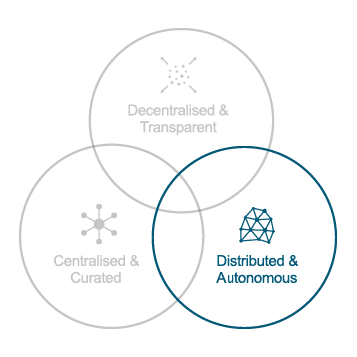
We will likely witness the recording, management, and utilization of a whole host of information in the not too distant future, including details of individuals’ activities. In such a society, the relationships between people and between people and organizations will undoubtedly change. Our TRUST 2030 project devised three social formats based on different relationships between people and organizations in order to explore potential resultant new forms of trust. In this scenario, we depict the type of trust likely to be formed in a Distributed & Autonomous society.
In a Distributed & Autonomous society, people’s lives are not built entirely upon trust towards companies, the country, or other individuals. For example, the sense of trust formed among people involved in the local community is an important factor in this type of society that helps enrich people’s social lives. Remove that sense of trust and the city would become a cold, distant place and its citizens would experience a solitary existence.
The spread of online shopping and large supermarkets is rendering the shopping experience more and more convenient but, at the same time, is moving the focus of people’s economic lives further away from the regional community. As a result, small shops are, in some respects, no longer able to sufficiently fulfill the social role that they once played. Is it possible to support this feeling of trust in the local community and treasure a face-to-face economy forged between local shops and citizens?
The Cycle of Change is a digital money system that enables local shoppers, small shops, and restaurants to jointly revitalize their towns.
Towns that have adopted this system see citizens entrust small amounts of change left over after making small purchases in the area to the store through a simple smartphone app (for example, the 13 yen left over when you pay 500 yen for an item costing 487 yen ). In turn, shops can suggest fun ideas for revitalizing the local town, and once they have accumulated a stipulated target from change provided gradually from local purchases, the shop has the right to use those funds to put their proposed ideas into action.
Local citizens can help swell the pot of small change accumulated from daily payments and support the stores’ efforts to revitalize the local area. Meanwhile, stores can expand their horizons beyond their daily business activities and start small projects that will benefit local residents.
If we view the creation of new money that can only be used in the local area to support the local economy as a “local currency”, then the Cycle of Change is an initiative designed to support people’s independent efforts to enrich local regions by consistently using small amounts of legal tender, such as British pounds or Japanese yen, in the conventional way.


The Cycle of Change mechanism gives local shops the power to make their towns great.
What if a boutique store for young people proposed a scooter rental service for the shopping district? Customers who found the idea interesting could support the proposal little by little by buying a dress or other item of clothing from the store. Alternatively, a children’s shop might come up with an idea to subsidize the purchase price of books for local elementary school students.
As the conversation gets going and people around town start to hear comments like, “I have this idea. Please support me,” or “That project is going to be implemented soon,” they might feel tempted to pop into a shop that they had always passed by before.
If creative proposals submitted by local shops can be realized in this way with a little bit of support from the people who shop there, then shopping in the local town will become a more enjoyable experience and citizens and shops will be able to develop a richer relationship.


The Cycle of Change is a new way to connect local people.
Individual shops are able to make their ideas a reality because local residents get behind them. Economic activities such as the selling and buying of goods are a good way to support the development of face-to-face social relationships.
The Cycle of Change system has several features that enable the people supporting store proposals to share in those activities. For instance, the system can deliver a bar invitation to those people who helped realize the proposal to create a pop-up street bar. The system can also promote closer ties between local people when local residents who have lived in the same area as strangers finally get to meet each other through a jointly realized idea.
Without a doubt, local citizens can become the protagonists of community development by supporting the various ideas that shops come up with to enrich the town.
The circulation of money that kicks off with small change will eventually inspire a cycle of change in town life. That is how the Cycle of Change can help revitalize communities.
